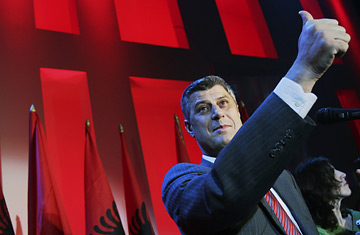
Hashim Thaci, the head of the Democratic Party of Kosovo, gestures to his party supporters after claiming victory in Kosovo's parliamentary election in Pristina early November 18, 2007. REUTERS/Hazir Reka (SERBIA)
Dressed in a grey pinstriped suit and burgundy tie, Hashim Thaci rolls his eyes and smiles as the power blinks off for the second time in his office in downtown Pristina, the capital of Kosovo. "Some government!" he groans. The former leader of the Kosovo Liberation Army, whose party just won general elections last weekend, is expected to be sworn in as Kosovo's Prime Minister soon. If he and other Kosovar leaders declare independence from Serbia — as they are expected to do by January — he will be the first PM of the newly sovereign state. In recent days, European Union leaders have urged Thaci and other leaders not to be too precipitous in declaring independence. But in his interview with TIME, Thaci brushed off fears that the announcement could destabilize the region. "The time for war is past, " he said. There was, he insisted, no need for further delay: "For me, Kosovo's independence is a done deal. We've waited long enough."
Thaci's views are widely shared among Kosovo Albanians, who make up 90% of the population of the Serbian province. For them, independence, under any circumstances, is overdue. In the just completed election campaign, for example, the question of what is known as Kosovo's "final status" barely rated a mention; candidates focused their campaigns instead on who was qualified to run an independent country, rebuild the economy and stamp out corruption. Misgivings about Kosovo's plans to declare independence unilaterally lie elsewhere.
Starting last year, the United Nations, which has administered the province since NATO planes drove Serb authorities out of the territory in 1999, has tried to broker a deal in which Kosovo would be granted independence with the consent of Serbia and the rest of the international community. But Belgrade, backed by Moscow, torpedoed the plan. By declaring independence, Kosovo is poised to take on its own Belgrade refuses to voluntarily give. Many Kosovo Serbs, who make up a minority of the province's population, have threatened to secede rather than be ruled by Pristina, while several European Union countries say they may not recognize the new country for fear that such recognition would set a precedent for other separatist groups elsewhere. This week, EU leaders stepped up pressure on Thaci and other leaders to put off the declaration at least until the rest of Europe could coordinate its response. "We need a soft landing in Kosovo if we are going to avoid a hard crash," said Sweden's foreign minister, Carl Bildt.
After waiting so long for independence already, Thaci and other Kosovo Albanian leaders may be willing to wait a few weeks longer. Thaci's declaration (to TIME and others) that he intended to declare independence "immediately" after a deadline for a negotiated solution expired on Dec. 10, may prove to have been mainly for domestic consumption. But he and other Kosovo Albanian leaders are probably not willing to wait longer than January.
European and American diplomats have been working hard over the past six months to see if there is middle ground that would allow for Kosovo to split amicably from Serbia, but Belgrade remains adamant that losing Kosovo, which most Serbs view as an ancestral homeland, is out of the question. Russia continues to support Belgrade's side. Russian officials have called Kosovo's plan to declare independence unilaterally, outside the rubric of the UN, an affront to international law, arguing that nothing should be done without Belgrade's approval and that warnings of violence in Kosovo if the province is not given independence are the equivalent of "blackmail."
The US and most major European states, meanwhile, counter that Kosovo is never going to consent to being ruled from Belgrade. US and EU mediators have largely reconciled themselves to the view that more talks between Serbs and Albanians would be fruitless. For his part, Thaci, who says he has matured from his days as a rebel leader ("I made mistakes," he admits), is already looking ahead to questions of energy supplies, road building and economic development. "I've changed," he told TIME, and he's intent on changing Kosovo, too.
